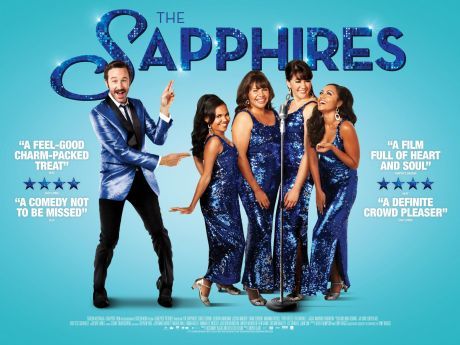Arts
You are here
Sisters are doin' it for themselves

May 9, 2013
The Sapphires tells the story (inspired by actual events) of four aboriginal women in 1960s Australia who form a singing group and go on to entertain the troops in Vietnam in the late 60s.
Three of the four singers are sisters who live on a reserve in Australia’s outback. There are many parallels between the shocking treatment of Australia’s aborigines and First Nations people here in Canada. The poverty and racism foisted on them and their families is the backdrop to this essentially cheerful and upbeat movie.
The three sisters—Gail (Deborah Mailman), Julie (Jessica Mauboy) and Cynthia (Miranda Tapselle)—go from the reserve to town to perform in a local talent contest, where they are greeted by racist jeers, in spite of the fact that they definitely have the most talent of anyone there.
However, they catch the eye and ear of an Irish music producer and promoter (a bit down on his luck and not entirely sober), who is providing musical accompaniment for the ‘acts’ at the talent show. The promoter, Dave Lovelace, is played by Chris O’Dowd. O’Dowd is the Irish actor who played the cop in the smart American comedy Bridesmaids. He excels at playing down to earth, sympathetic, non-sexist and funny—all great qualities if you’re looking for the opposite of ‘macho’ man.
And, in fact, The Sapphires does have some interesting parallels to Bridesmaids, even though the films take place in very different worlds, at first glance. They are essentially movies that portray women as they are, not as Hollywood movies would like them to be.
They’re also both about female solidarity against the odds.
Lovelace convinces the sisters that country and western (which is what they have mostly been performing) is not where it’s at and that they would make a great R & B, soul group that many (Black American) soldiers in Vietnam could identify with.
Dave manages to get them a gig entertaining the troops in Vietnam and on the way they pick up a fourth ‘Sapphire’—their cousin Kay (Shari Sebbens), who was a victim of the Australian government’s forced adoption policy. Kay was forcibly taken from her parents and placed with a white family in Melbourne. She is ‘light-skinned’ and therefore able to pass as ‘white’, unlike her three cousins.
This mirrors practices here in Canada where thousands of First Nations children were taken forcibly from their parents and placed in residential schools or as foster children in white families, wrenching them away from their families and cultural identities, and leaving them open to sometimes horrific abuse.
This experience has made Kay painfully confused about her identity and is one of the conflicts that arises between she and her cousins on their road trip in Southeast Asia.
The film makes some astute comparisons between the experiences of these women and the ‘brothers’ they entertain once they get to Vietnam. There is footage of the famous interview with Mohammed Ali, who went to jail because he refused to fight in Vietnam, saying “No Viet Cong ever called me n…..”.
When Dave is trying to convince the sisters to look to Motown rather than Memphis for inspiration, he succinctly defines the two genres: country music is about pain and misery that can only be faced stoically as an inevitable part of life, whereas soul music looks at
this same misery but insists on hope and resistance, if not explicitly, then in the raw joy of the music itself.
The same could be said of this movie, which does look at the racism and inequality that these women and their community suffer, but also shows them as strong women who lean on each other and their extended families to create a space for themselves.
At the end of the film we learn that one of the co-writers of the script for the movie, Tony Briggs, is also the son of one of the real ‘Sapphires’. We also learn that since the 60s all the members of the group have continued to fight racism against Australia’s aborigines,
in their own way.
See this movie for good politics, great music and a lot of fun besides!
Section:










